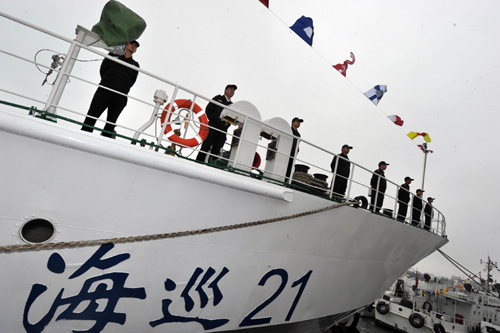|
 |
|
WEIGH ANCHOR: China's first helipad-equipped oceangoing patrol vessel for service in the South China Sea, Haixun 21, is enlisted in Haikou, capital of Hainan Province, on December 27, 2012 (XINHUA) |
The 18th National Congress of the Communist Party of China (CPC), which was held in November 2012 to set the tone for China's future policies, reaffirmed the country's commitment to peaceful development, a principle that will remain one of the most important guidelines for the country's foreign policy. At the same time, however, the rise in China's status amid an altered international situation calls for adaptations to its diplomatic strategy.
As the threat of instability and uncertainty around the world grows, the next decade will be marked by dramatic changes and global challenges. It will be also a pivotal era for China's bid to become a positively viewed global power. Diplomacy will therefore require major breakthroughs on many issues.
A white paper released by the Chinese Government in September 2011 titled China's Peaceful Development said that China is firm in upholding its core interests, including state sovereignty, national security, territorial integrity and national reunification, as well as its political system established by the Constitution, overall social stability, and the basic safeguards for ensuring sustainable economic and social development.
China's core interests are both multifaceted and wide-ranging. As its national strength grows, the country's diplomatic efforts must rise to defend those core interests. A grand strategy with a comprehensive approach is needed, with a healthy dose of caution when pitting core interests against the overall development objectives of China. Its diplomatic approach is not an either/or question between perceived "softness" and "toughness."
China's reaction to the disputes over Huangyan Island and the Diaoyu Islands in 2012 could be described as remarkable. In the face of provocation by Japan and the Philippines, China used a combination of diplomatic protests, political consultations, tools of international law, public opinion and routine marine law enforcement to safeguard its sovereign rights over the territories. China has held consistently to the principle of shelving disputes in favor of joint resource development, preferring peaceful dialogue, but never fearing the threat of military force.
As an Asian country, China is located at a convenient foothold for the extension of global influence. However, in recent years, some neighboring countries have expressed concern over China's growing strength. The United States has also taken the chance to adjust its Asia-Pacific strategy, thereby stirring up internal disputes in the region.
Changing regional dynamics demand China adjust its policies concerning its neighboring countries.
The new adjustment should focus on deepening economic relations, strengthening security cooperation and striking a balance between economic and security ties. Economically, China should collaborate with its neighbors to forge alliances in various industries such as energy, enhance regional connectivity, pursue more currency swap deals and promote economic prosperity and financial stability. In terms of security, China should invest more in regional traditional and nontraditional security cooperation. It should take a firm position against attempts to jeopardize regional peace and stability, conduct active diplomacy over regional hotspot issues, and provide more security assistance to neighboring countries.
Although territorial and maritime disputes are sometimes unavoidable, stability in the South China Sea serves the interests of all parties involved. On the one hand, China firmly opposes actions that threaten its sovereignty and marine rights; on the other hand, it should continue working to create and maintain a peaceful atmosphere for dispute settlement through dialogue and joint development. The Declaration on the Conduct of Parties in the South China Sea (DOC) has been in effect for more than 10 years. China should encourage other countries concerned to work together to pave the way for substantive negotiations on a code of conduct in the area based on the DOC. Joint development of South China Sea resources, such as oil and gas exploration, fishing and tourism, needs to be kept on the agenda.
|
